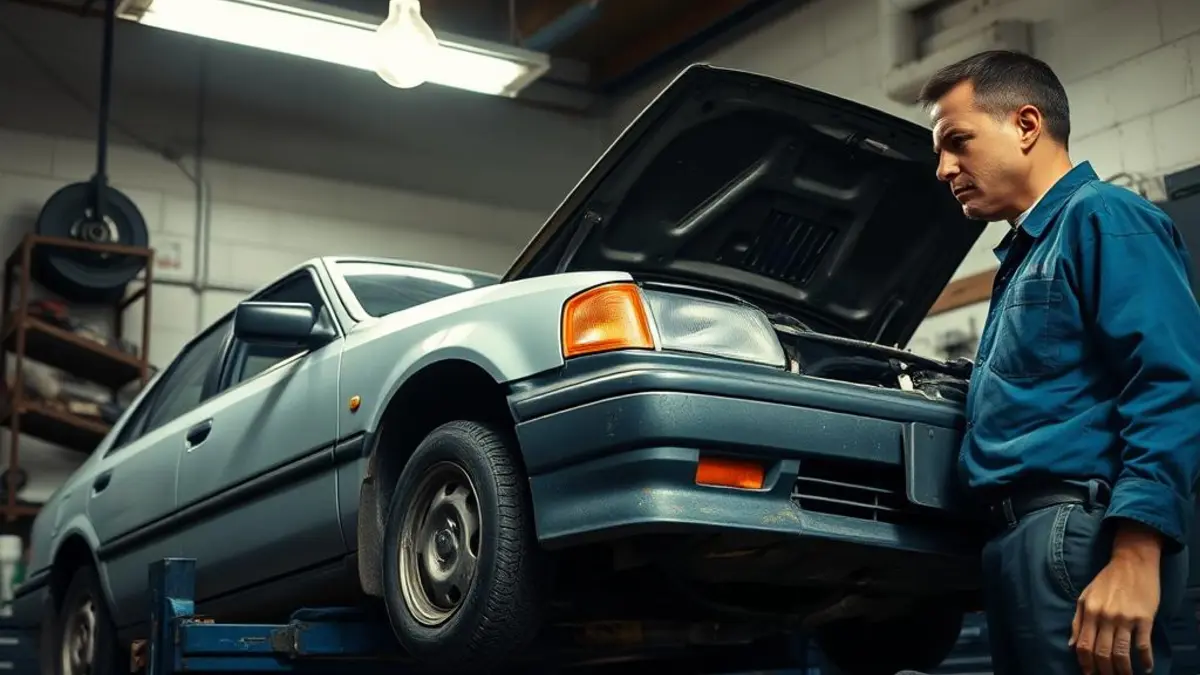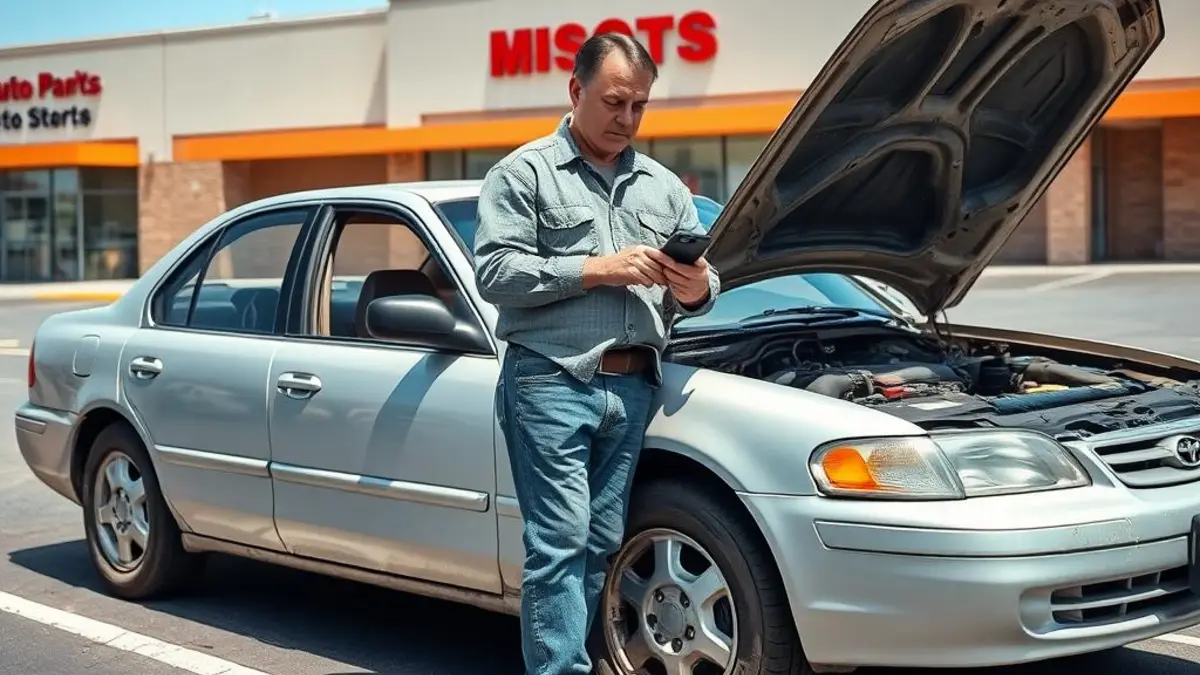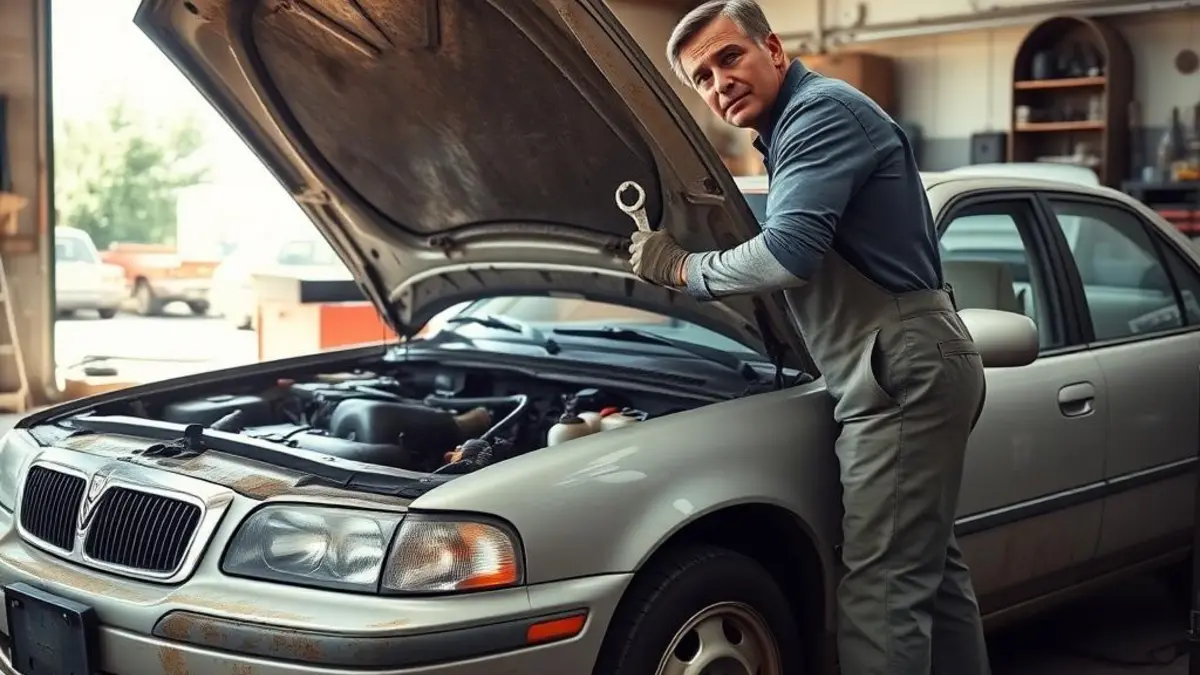Is It Worth Fixing My Car? A Guide for Major Repairs
Estimated Reading Time: 8 minutes
Facing an expensive car repair bill can leave you wondering: is it worth fixing my car or should I just replace it? This question becomes especially difficult when dealing with major powertrain issues like engine or transmission problems. The decision between investing in repairs or cutting your losses isn’t always straightforward.
In this guide, we’ll help you make an informed choice by examining repair costs, vehicle value, and practical alternatives when facing significant mechanical problems.
Key Takeaways
- Understand the 50% Rule: If repair costs exceed half your car’s value, consider replacement.
- Major powertrain repairs like engine or transmission work can be costly, ranging from $1,500 to over $8,000.
- Assess your vehicle’s age and mileage; different thresholds apply for cars under 150,000 miles versus those over 200,000 miles.
- Explore options for selling a car with mechanical issues, including private sales, trade-ins, and instant-offer platforms.
- Use online tools like Kelley Blue Book and RepairPal to estimate vehicle value and repair costs accurately.
In This Article:

The 50% Rule: When Repairs Become Too Expensive
One of the most widely accepted guidelines in the automotive world is the 50% rule. If your car repair is too expensive and exceeds half of your vehicle’s current market value, it’s often better to sell rather than fix it. You may want to avoid being scammed and get info via AI, read this article: avoid being scammed
For example, if your vehicle is worth $6,000 and you’re facing a $3,500 repair bill, you might want to consider selling instead of repairing. This threshold exists because once repair costs approach or exceed 50% of the car’s value, you’re unlikely to recoup that investment when you eventually sell the vehicle.
The 50% rule helps answer the question “is it worth fixing my car?” by providing a clear financial benchmark for your decision.
[Source: https://artoftroubleshooting.com/2014/04/25/the-50-percent-rule-repair-or-replace-revisited/]
**”The 50% rule is a financial compass, guiding you away from potentially wasteful repair investments.”**
Major Powertrain Repair Costs to Consider
Engine Replacement Cost
A complete engine replacement typically ranges from $3,000 to $8,000 or more. This cost varies based on:
- Engine type (4-cylinder, V6, V8)
- New vs. remanufactured parts
- Labor rates in your area
- Vehicle make and model
More complex engines in luxury vehicles can push costs well above $10,000. Even after replacement, you may face related issues with connecting systems.
Transmission Rebuild Cost
Transmission rebuilds generally cost between $1,500 and $4,000, with complete replacements sometimes reaching $5,000+. Factors affecting this price include:
- Automatic vs. manual transmission
- Vehicle make and model
- Severity of damage
- Parts availability
A rebuilt transmission might last 30,000-50,000 miles, while a brand new one could extend to 100,000 miles under proper maintenance.
[Source: https://www.nerdwallet.com/article/loans/auto-loans/fix-sell-car]
“Major powertrain repairs are like open-heart surgery for your car; understand the costs and potential outcomes before proceeding.”
Warning Signs of Critical Powertrain Issues
Engine Failure Symptoms
Watch for these warning signs that indicate serious engine problems:
- Knocking or ticking sounds, especially when accelerating
- Blue or white smoke from the exhaust
- Consistent check engine light
- Significant oil leaks or burning oil
- Sudden loss of power or performance
- Overheating
Transmission Problem Indicators
Your transmission might be failing if you notice:
- Difficulty shifting gears or delayed engagement
- Burning smell from under the hood
- Grinding or shaking during gear changes
- Slipping out of gear while driving
- Transmission fluid leaks or dark, burnt-smelling fluid
- Strange noises when in neutral
Addressing these issues early can sometimes prevent complete failure and reduce repair costs.
[Source: https://www.peddle.com/repair-or-sell-my-car]
“Ignoring powertrain warning signs is like ignoring a ticking time bomb; address them promptly to avoid catastrophic—and costly—outcomes.”
Decision Thresholds Based on Vehicle Age and Mileage
Under 150,000 Miles
For vehicles with fewer than 150,000 miles, repairs often make financial sense when:
- The car is less than 10 years old
- Repair costs are under 30% of the vehicle’s value
- The vehicle has been well-maintained
- No other major systems are showing signs of failure
At this mileage, many vehicles still have significant useful life remaining after repairs.
Over 200,000 Miles
When your odometer passes 200,000 miles, is it worth fixing my car? Consider selling when:
- Multiple systems are beginning to fail
- Repairs exceed 30% of the vehicle’s value
- The car has a history of reliability issues
- You need more dependable transportation
High-mileage vehicles typically face diminishing returns on repair investments as components wear out more frequently.
[Source: https://artoftroubleshooting.com/2014/04/25/the-50-percent-rule-repair-or-replace-revisited/]
“Mileage is more than just a number; it’s a measure of your vehicle’s remaining lifespan and a key factor in your repair-or-replace decision.”
How to Sell a Car with Mechanical Issues
If you decide against repairs, you have several options to sell your car with mechanical issues:
- Private sale: Requires honesty about the car’s condition but may yield the highest return. List on marketplace sites with detailed information about the problems.
- Trade-in: Dealerships will take damaged vehicles but expect significantly reduced value.
- Instant-offer platforms: Companies like Carvana, Vroom, and Peddle will purchase vehicles with mechanical issues, often with free towing.
- Junkyards or scrap yards: For severely damaged vehicles, these offer payment based on weight and salvageable parts.
To maximize value when selling a damaged vehicle:
- Get multiple offers to compare
- Have documentation of the vehicle’s history and issue diagnosis
- Clean the car thoroughly before appraisal
- Be upfront about problems to avoid complications
If you are thinking about repairing or replacing your car, check out this calculator to help you decide what’s best: https://uslifestyles.org/repair-or-replace-car-calculator
[Source: https://www.experian.com/blogs/ask-experian/should-you-repair-or-sell-car/]
“Selling a car with issues requires transparency and savvy; explore all avenues to maximize your return and minimize headaches.”
Tools to Help Make Your Decision
Several online resources can help you gather information for your repair-or-sell decision:
- Kelley Blue Book (KBB.com): Determines your car’s current market value in its pre-repair condition
- RepairPal: Provides estimates for specific repairs based on your location and vehicle
- Edmunds True Cost to Own: Calculates the five-year ownership costs including depreciation and maintenance
- Instant-offer sites: Carvana, Vroom, and Peddle offer quick online valuations for your vehicle as-is
Using these tools together gives you a clearer picture of your financial options.
[Source: https://www.peddle.com/repair-or-sell-my-car]
“Knowledge is power; utilize online resources to gather data and make an informed, financially sound decision about your vehicle.”
Real-Life Decision Examples
Example 1: $4,000 Engine Repair on $5,000 Car
A 2010 Honda Civic with 175,000 miles needs a $4,000 engine replacement. The car’s market value is approximately $5,000 in good condition.
Decision: Sell the vehicle. The engine replacement cost is 80% of the car’s value, exceeding the 50% rule. Additionally, at this age and mileage, other components will likely need attention soon.
Example 2: $2,000 Transmission Repair on $15,000 Car
A 2017 Toyota RAV4 with 90,000 miles requires a $2,000 transmission repair. The vehicle’s market value is approximately $15,000.
Decision: Fix the vehicle. The repair represents only 13% of the car’s value, well below the 50% threshold. With Toyota’s reputation for longevity, this vehicle likely has many useful years remaining after the repair.
To afford these repairs or replacement, use this tool to assist you with travel credit cards: https://uslifestyles.org/best-credit-cards-for-travel
“Real-world examples provide clarity; analyze these scenarios to gain insights into making the right choice for your own situation.”
Quick Tips to Reduce Repair Expenses
If you decide to repair your vehicle, consider these cost-saving strategies:
- Get multiple quotes: Prices can vary significantly between shops
- Consider independent shops: They often charge less than dealerships for the same repairs
- Ask about rebuilt or remanufactured parts: These can cost 30-50% less than new OEM parts
- Negotiate labor rates: Some shops will adjust their hourly rate for larger jobs
- Request a payment plan: Many repair shops offer financing options
- DIY what you can: Handle simpler tasks yourself, like replacing air filters or spark plugs
[Source: https://www.nerdwallet.com/article/loans/auto-loans/fix-sell-car]
“Repairing doesn’t have to break the bank; employ these strategies to minimize costs and keep your vehicle running smoothly without emptying your wallet.”
Final Decision Checklist
Before making your final decision on whether it’s worth fixing your car, ask yourself these critical questions:
- Will this repair extend the vehicle’s life by at least two years?
- Is this the first major repair, or part of an ongoing pattern?
- Can I afford the repair without financial hardship?
- Does the vehicle still meet my needs for space, features, and reliability?
- How does the repair cost compare to 6-12 months of payments on a replacement vehicle?
Your answers will help clarify whether repair or replacement makes more sense for your situation.
[Source: https://www.experian.com/blogs/ask-experian/should-you-repair-or-sell-car/]
“A final checklist ensures you’ve covered all bases, leading to a rational decision that aligns with your financial stability and transportation needs.”
FAQ
Q: What is the 50% rule?
A: The 50% rule suggests that if a car repair costs more than 50% of the vehicle’s current market value, it’s generally better to replace the vehicle.
Q: Where can I find my car’s market value?
A: Resources like Kelley Blue Book (KBB.com) and Edmunds can help you determine your car’s current market value.
Q: What if my car has sentimental value?
A: Sentimental value can make the decision harder, but it’s essential to balance emotional attachment with financial prudence. Consider all factors before deciding.
Q: What if the repairs are just slightly over the 50% mark?
A: Even if repairs slightly exceed the 50% threshold, consider the age and overall condition of your vehicle. If other repairs are likely to arise soon, replacement might still be the best option.
Q: Can I negotiate repair costs with a mechanic?
A: Yes, it’s often possible to negotiate repair costs. Get multiple quotes, ask about using remanufactured parts, and see if the shop will adjust labor rates.
Conclusion
Deciding if it’s worth fixing your car involves balancing financial considerations with practical needs. The 50% rule offers a helpful starting point, but your specific circumstances matter too.
For major repairs like engine replacements or transmission rebuilds, carefully weigh the costs against your vehicle’s age, condition, and value. Sometimes, investing in repairs makes sense. Other times, selling the vehicle and moving on is the wiser choice.
Use the tools and guidelines we’ve provided to make an informed decision that works for your budget and transportation needs. Remember that emotional attachment to a vehicle can cloud judgment, so try to approach the decision with objectivity.
[Source: https://www.peddle.com/repair-or-sell-my-car]
-

 Best Picks1 year ago
Best Picks1 year agoDriving Insurance: Get the Best Car Coverage Without Overpaying
-

 Best Rewards7 months ago
Best Rewards7 months agoBest rewards credit cards in 2025 for everyday use
-

 Personal Growth & Mindset1 year ago
Personal Growth & Mindset1 year agoTed Lasso Effect: 5 Goal-Setting Secrets You Must Know
-

 Personal Growth & Mindset1 year ago
Personal Growth & Mindset1 year agoMachado de Assis: This Viral TikTok Explains Why You Need to Read ‘The Posthumous Memoirs of Brás Cubas’ Now
-

 Career & Success1 year ago
Career & Success1 year agoChallenges of Not Having Goals: 5 tips to help you get started
-

 AI & Future Trends1 year ago
AI & Future Trends1 year agoAI in Time Management 2024: A New Era of Productivity for Business Leaders









